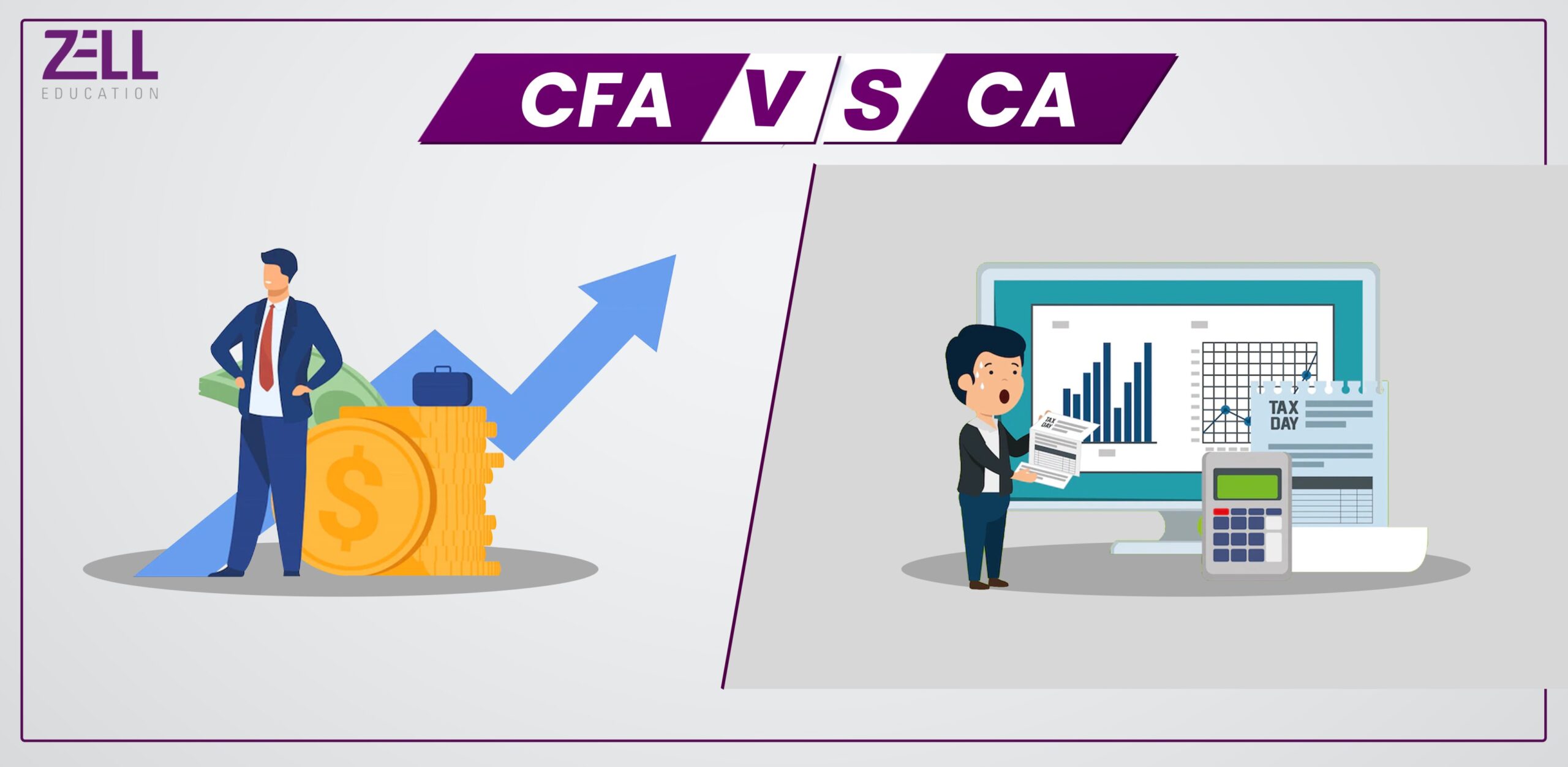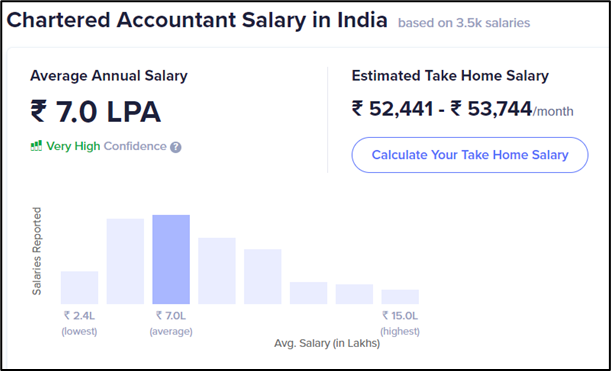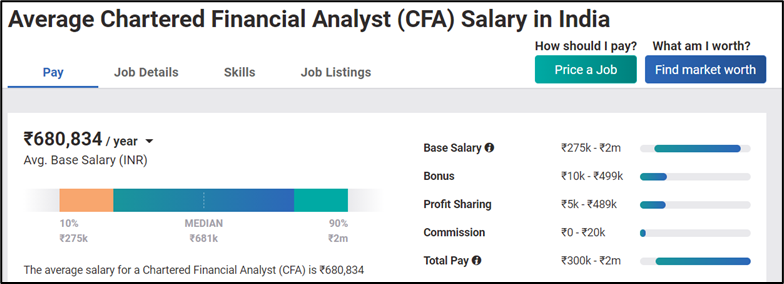The future prospects of both these courses are extremely bright, but if you have to make the right choice, you need to consider the difficulty, duration, future scope and eligibility of each of these courses.
| Differentiators | CA | CFA |
| Organizing Body | ICAI – The Institute of Chartered Accountants of India | CFA Institute |
| Course Duration | 5 years | 2 to 3 years |
| Difficulty Level | 5.84% (Both groups) | CFA Level 1 22% – 49% |
| Eligibility Criteria | The applicant should have successfully completed their 10th and 12th examination to appear for the entry-level CA foundation course with a 50% aggregate score in 12th. | If you are in the final year of graduation, you can appear for the CFA level 1 examination. However, in certain cases, you may be eligible for CFA without graduation provided you have a minimum of 4 years of relevant work experience. |
| Career Scope |
|
|
| Top Hiring Firms | All firms, across all industries | The Big 4s, MNCs |
| CA vs CFA Salary in India | INR 6 to 10 lpa | INR 5 to 20 lpa |
CA vs CFA – An Overview
When it comes to building a career in finance and accounting, both Chartered Accountancy (CA) and Chartered Financial Analyst (CFA) stand out as prestigious qualifications. CA, governed by the Institute of Chartered Accountants of India (ICAI), focuses more on accounting, taxation, and audit, while CFA, offered by the CFA Institute, is internationally recognized for expertise in investment management, portfolio strategy, and financial analysis. Both courses are highly rewarding and challenging, but they differ significantly in terms of curriculum, career opportunities, and global reach.
What is the Difference Between CA vs CFA?
While both CA and CFA open doors to successful finance careers, they cater to different interests and industries. CA primarily equips you with skills in auditing, taxation, accounting, and financial reporting. It’s highly valued in corporate finance, audit firms, and consultancy services. On the other hand, CFA trains you extensively in investment management, equity research, portfolio management, and financial analysis, making it ideal for roles in investment banking, asset management, and global financial services. If you are passionate about accounting and regulatory aspects, CA would be a better fit, whereas if your interests lie in investments and global finance, CFA should be your choice.
CFA vs CA Career Benefits and Compensation
CA vs CFA both are professional learning courses that require dedication. While The CA course can be pursued right after your 12th, the CFA course generally requires a graduation degree. However, if you are a CA who wishes to pursue CFA certification, you are not only going to get the best of finance and accounting knowledge, but also a high salary package for advanced skill sets.
However, keeping the aspect of dual certification aside, let’s take a look at the individual benefits of each of the courses.
| Chartered Accountancy | Chartered Financial Analyst |
| Varied career choices | A career in the exciting field of investments |
| Gives you analytical and problem-solving ability | Gives you cutting edge research skills |
| High compensation with recognition | High compensation with incentives |
| Prestigious career choice | Demanding career choice |
| Signing authority anywhere in India | Global career options |
Now coming to the salary differentiation between the courses in India, here a glimpse into the average CA salary in India and average CFA salary in India.
Got Questions Regarding CA vs CFA?
Click Here for a Free Counselling Session
CA Salary in India
Average CFA Salary in India
Having cleared the CA exams in itself is a commendable job. It provides you with ample opportunities across different industries. Getting a CFA qualification would add another feather to your already glittery cap. It is one of the options you can consider to advance your career even further.
We have provided a comprehensive list of reasons explaining the benefits you can have as a practicing CFA charterholder. Being one of the most sought-after certifications, it provides a steep learning curve for professionals and also a vast exposure to the world of finance. Before making a decision, You should see whether your future goals align with the options you are considering.
Furthermore, clearing the CFA examination is comparatively easier for a Chartered Accountant, which adds another advantage. If you wish to prepare for easy CFA study plan for the CFA examination, you can check out our comprehensive course at Zell Education to boost your professional journey. If you have any queries, please don’t hesitate to email us at [email protected].
Planning to Pursue CFA Accounting Career?
To Book Your Free Counselling Session
Conclusion
Choosing between CFA vs CA depends largely on your career aspirations, interests, and long-term goals. Both are respected credentials and can lead to lucrative careers. If you’re aiming for a stronghold in accounting, taxation, and audit within India or countries with mutual recognition agreements, CA is the way to go. However, if you dream of a global finance career with expertise in investment management and analysis, CFA might suit you better. If you’re still unsure, many professionals also choose to pursue both qualifications for an added edge in the finance industry.
FAQs on CFA vs CA
Should I do both CA vs CFA?
We highly recommend you pursue the CFA certification after your Chartered Accountancy. CA and CFA individually ensure quite a rewarding career. However, having both CFA and CA certification undoubtedly opens up ample possibilities.
What are the benefits of CFA?
Having the CFA certification opens up a door to the finance and accounting industry. It helps you gain analytical skills and knowledge in subjects like Investment Analysis, Portfolio Management, Quantitative Methods, Economics, which are all in-demand knowledge for rising through the ranks in the finance industry. Not only this, but it also provides you with handsome compensation.
Is it worth doing CFA after CA?
CFA is an excellent choice if you want to have outstanding expertise and knowledge in the accounting and finance industries. Also, if you are interested in making a career abroad, the CFA and a CA is a great combination.
Who gets more salary, CA vs CFA?
Salaries for both CAs and CFAs can vary based on experience, industry, and location. On average, a CA in India earns between INR 6 to 10 LPA, whereas a CFA can earn anywhere between INR 5 to 20 LPA depending on the company and the role. Globally, CFAs often have an advantage when it comes to compensation, especially in investment roles. However, a CA with several years of experience can also command high salaries, particularly in leadership positions within accounting and finance.
Which is tougher, CFA or CA?
Both CA and CFA are challenging in their own right, but CA is often considered tougher, particularly due to its lower passing rates and comprehensive syllabus that covers accounting, law, taxation, and audit. CA students are also required to complete a mandatory 3-year articleship which adds practical exposure but increases the overall difficulty. CFA, while intense, especially at Level 2, tends to have relatively higher pass rates per level compared to CA exams and can be completed faster if approached diligently. That said, the “toughness” largely depends on an individual’s aptitude, interest, and study strategy.



